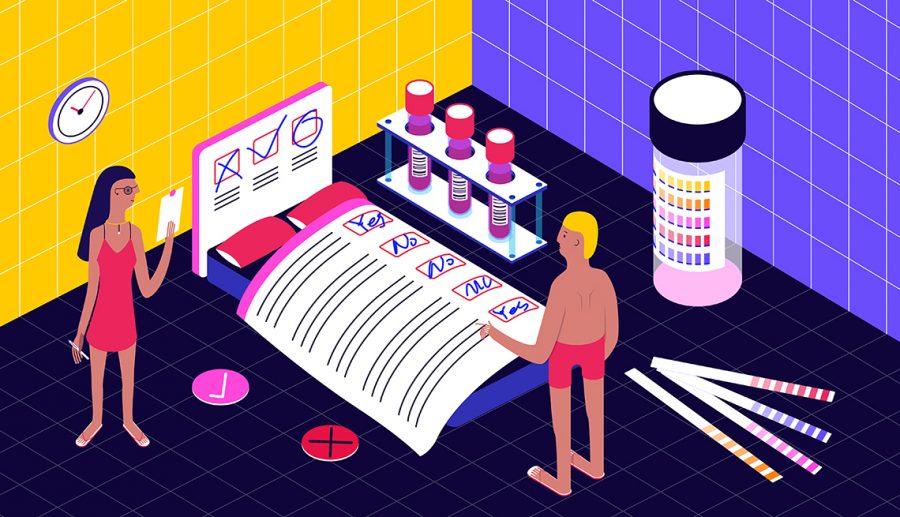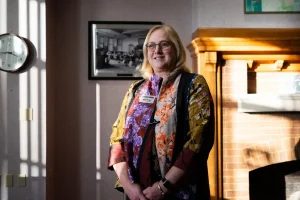STI rates at UWL and the stigma behind getting tested
Retrieved from AARP.
April 6, 2020
According to the CDC, STI rates in the United States are continually rising, and adolescents ages 15-24 make up half of new STI cases. The Student Health Center website, says this also true at the University of Wisconsin-La Crosse. The website states: “In La Crosse County, chlamydia rates continue to be high every year. Gonorrhea and syphilis rates have risen dramatically over the last two years.”
“[For] gonorrhea and chlamydia testing for UWL students from July 1, 2019, through Jan. 20, 2020, there were 821 total people tested,” said Jill Anderson, senior nurse specialist at the Student Health Center. “Juniors had the highest number of positive chlamydia results at 26.”
Since STI rates are rising, especially among the demographic that populates UWL, it is extremely important for sexually active students to be vigilant about getting tested for STIs.
“A lot of STIs, their symptoms go unnoticed,” said Lilli Minor, a peer health advocate for the wellness and health advocacy office at UWL. “So, if you have an STI, you could very easily be spreading that STI without knowing it, simply because you don’t have symptoms. It’s just important as a regular, sexually active routine to get into if you’re having sex, going to get tested, is just something that should be routine.”
Students at UWL have a few different options for getting tested for STIs.
“The Student Health Center has a walk-in STI clinic where students can get free gonorrhea and chlamydia testing and $15 HIV testing, with a $5 lab fee,” said Anderson. “We also have an STI clinic in the fall and spring semester where gonorrhea, chlamydia, and HIV testing are done for free.”
“HIV is a blood test, so they prick your finger, otherwise chlamydia and gonorrhea are urine tests,” said Minor. “It’s super easy, not intimidating at all, and the Student Health Center Staff are likely happy you’re there, taking care of yourself, and taking care of your sexual life as well.”
But with the rise of COVID-19, students are required to call the Student Health Clinic first if they are interested in getting tested. When a student comes in they will be screened for respiratory symptoms and given a lab appointment.
If a student tests positive for an STI, treatment can be received at the Student Health Center and there are different treatment options, even if the STI in question is not curable.
“Each STI has a treatment of its own,” said Anderson. “Some STIs like chlamydia and gonorrhea are caused by a bacterial infection and can usually be treated with antibiotics. However, an STI like herpes is caused by a virus and cannot be cured, but, there is an anti-viral medication that can be taken to help the number of outbreaks.”
Despite the negative associations surrounding STIs, Anderson believes that it’s important for students to be tested anyway. “Although there is still a lot of stigma around STIs, I believe more people are aware of them,” said Anderson. “However, just being aware of STIs isn’t enough. People need to be proactive to prevent STIs and get tested.”
“The stigma really just comes from our society’s view on sex and sexuality. We are a college campus, and a lot of times, college campuses have higher rates of STIs because it is a population that has more ‘risky sexual practices,’ meaning unprotected sex, more partners, and things like that,” said Minor. “I think that stigma is wrong. We’re sexual beings, and also there’s a possibility of not being a sexual being, but just broadening the view on sexuality because it’s something that we all have, with the potential exception of asexual folx. So the stigma surrounding it shouldn’t exist because it’s naturally something that happens.”
Originally, a free STI clinic was planned for April 30. Dr. Abby Deyo said that the Student Health Center is looking for other ways to make sure students still feel welcome to get tested.
“We are exploring alternate ways to do an STI clinic for April as we are concerned not enough testing is being done currently. It would require spacing of students to be screened to minimize COVID risk,” said Deyo. “The event is usually partially funded by county health dept, but they are not able to help currently. The bigger problem is ARCW is not doing any in-person testing making it difficult for us to offer free HIV testing. We are working on an alternate option for that currently as its always been important for us that the event is free.”







